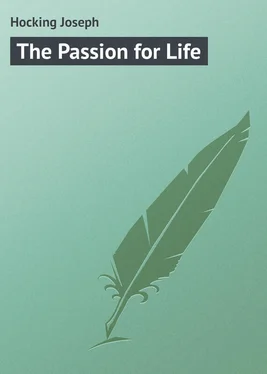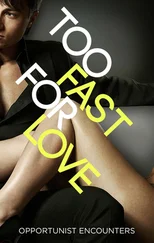Joseph Hocking - The Passion for Life
Здесь есть возможность читать онлайн «Joseph Hocking - The Passion for Life» — ознакомительный отрывок электронной книги совершенно бесплатно, а после прочтения отрывка купить полную версию. В некоторых случаях можно слушать аудио, скачать через торрент в формате fb2 и присутствует краткое содержание. Жанр: foreign_prose, Зарубежные любовные романы, на английском языке. Описание произведения, (предисловие) а так же отзывы посетителей доступны на портале библиотеки ЛибКат.
- Название:The Passion for Life
- Автор:
- Жанр:
- Год:неизвестен
- ISBN:нет данных
- Рейтинг книги:4 / 5. Голосов: 1
-
Избранное:Добавить в избранное
- Отзывы:
-
Ваша оценка:
- 80
- 1
- 2
- 3
- 4
- 5
The Passion for Life: краткое содержание, описание и аннотация
Предлагаем к чтению аннотацию, описание, краткое содержание или предисловие (зависит от того, что написал сам автор книги «The Passion for Life»). Если вы не нашли необходимую информацию о книге — напишите в комментариях, мы постараемся отыскать её.
The Passion for Life — читать онлайн ознакомительный отрывок
Ниже представлен текст книги, разбитый по страницам. Система сохранения места последней прочитанной страницы, позволяет с удобством читать онлайн бесплатно книгу «The Passion for Life», без необходимости каждый раз заново искать на чём Вы остановились. Поставьте закладку, и сможете в любой момент перейти на страницу, на которой закончили чтение.
Интервал:
Закладка:
Young Hugh Lethbridge told her that he intended writing to the Prime Minister, offering her services as general adviser to the Government, while her daughter laughingly remarked that she would wear herself out in attending to the affairs of people who had a distinct preference for attending to their own business. Mrs. Lethbridge took it all in a good humor, however, and seemed to regard it as her chief business to be a universal helper. She even went so far as to instruct me how I might deal with Simpson, and gave me a great deal of valuable advice on housekeeping.
I found that Isabella Lethbridge was entirely different from her mother. On the whole she puzzled me. That she was intelligent there could be no doubt whatever. In many ways she was attractive, but on the whole I did not like her. For one thing, I thought she showed bad taste in holding up her mother to ridicule, while more than once I thought she revealed an almost sullen disposition. Still, she was interesting. She was more than ordinarily good-looking, and at times became quite animated.
The family, as a whole, did not strike me as ideal. They seemed to be at cross-purposes with each other. I could see that Mr. Lethbridge did not at all understand his son, and resented any difference of opinion which might exist between them. He apparently regarded Hugh as a boy who should unquestioningly obey his father's behests without regard to his own feelings and opinions; and yet he seemed to be angry with him for not being something in the world which would give him a position among his fellow-men.
And yet I am sure Mr. Lethbridge meant well. He was, as I have before suggested, a strong, capable man, and fully bore out what I had heard concerning him. He could never have been a nonentity, wherever he was placed, and whatever he took in hand he would do with such conscientiousness and thoroughness as to make it succeed. Consequently, it was no wonder that he had risen from a poor lad to be a man of wealth and of eminence in the county. That he was exceedingly ambitious there could be no doubt, and I judged that he was a little bit sore that all his ambitions had not been realized. He seemed composed of contradictory elements. On one hand, he seemed a man of the Napoleonic order, who would make everything and every person yield to his desires. On the other, I judged him to be a man who wanted to be strictly honest and conscientious, a man who would not give up one iota of his convictions, even if by so doing he could gain the things he desired.
Although no plain statement was made at the dinner-table to that effect, I gathered that he had suffered socially because of his adherence to what he termed his Nonconformist principles, and that he would have taken his position among the county families had he not remained true to the Chapel he had attended as a boy. On the other hand, however, that same Chapel, as it seemed to me, was a fetish rather than something which vitally affected his life.
I am spending some time in recording my impressions about this family, because I was brought into close contact with it in later days, and also because the various members of it affected me considerably.
"Yes," said Mr. Lethbridge, as we sat in the smoke-room, "I am an old-fashioned man, Mr. Erskine. I do not believe in giving up my early convictions simply because they are not popular."
"What are your early convictions?" asked Hugh.
"I mean my Nonconformist principles. See what Methodism has done for Cornwall, see what it has done for the whole country for that matter."
"Yes, what has it done?" asked Hugh.
"It has changed Cornwall from being drunken and godless into the most sober and God-fearing part of the country."
"Admitted," replied the son. "But who cares anything about Methodism now?"
"I am surprised and ashamed of you, Hugh, talking like that," said the father. "What is your opinion about it, Mr. Erskine?"
"My opinion about what?" I asked.
"Don't you think a man should stand by his principles?"
"His principles, certainly," was my reply, "especially if, after having tested them, they proved to be vital; but I am rather interested in what your son says. I have been reading John Wesley's Journal , and I cannot help realizing the tremendous influence he wielded over a hundred years ago in this very county; but what troubles me is that it seems to mean comparatively little now."
"I don't understand you," he said, rather brusquely.
"What I want to know," I said, "is this. Does Methodism, or for that matter, does religion of any sort, vitally affect the lives and outlook of people now? If it does, why is it that its hold seems to be weakening day by day? I am told that your Chapel used to be crowded, and that while the people were ignorant, Methodism vitally influenced their lives; but now it seems a kind of corpse. It has a name to live, but is dead. This afternoon, Simpson, my man, brought me a book which belonged to his father. That book describes what the people used to do for their faith. Even the women worked to bring stones to build the chapels, while the men toiled hours after their ordinary work was over, as a labor of love, in order to erect the buildings which their children and their children's children neglect and often despise. Everything seems stereotyped. Most of the people seem to care little or nothing about what their forbears would die for, and those that do care seem to regard it in a half-hearted way, and talk about it as something that has been rather than something that is."
"Yes," said Mr. Lethbridge, with a sigh, "I am afraid you are right. The old fire has gone, faith has largely died out, real earnestness seems a thing of the past; and yet what can one do?"
"I am afraid I am not the one to ask," I replied. "You see, I am a rank outsider so far as that kind of thing is concerned."
"For that matter the Church of England is no better," said Mr. Lethbridge.
"Should that console one?" I asked. "Cornwall, as I understand, used to be the home of religious activity, of unquestioning faith, of devoted fervor; but to-day people are careless, materialistic. Faiths which at one time were held tenaciously, doctrines which were believed in unquestioningly, are now apparently a dead letter."
"I suppose you are a Churchman, Mr. Erskine," said Mr. Lethbridge.
"I am afraid I am nothing," I replied. "For several years I did not put my foot inside a Church of any sort."
"Indeed, how is that?"
"I suppose I had no interest," I said. "That was why going to Church on Sunday was something new to me. I felt like a man witnessing a strange thing, and trying to understand something which was unfamiliar."
"Yes, and how did it impress you?"
"Everything was so unconvincing," I replied. "The note of reality was never struck at all."
"But surely," said Mr. Lethbridge, "you are not an atheist?"
"I am nothing," was my answer. "I wish I were. I suppose you know why I came here?"
"Yes, I have heard," he replied, "and I am very, very sorry for you, and you such a young man too, and life opening up all sorts of possibilities. Perhaps, however, it is not as bad as you think; the doctor may have made a mistake."
"I am afraid there is no hope of that," was my reply. "The man who examined me has the reputation of being the most eminent diagnostician in his profession; but if you religious people are right, it does not matter. If John Wesley, whose diary I have been reading, is right, what we call life, that is, life here, is a very small matter; it is only a fragment of life. Death, according to him, is only an episode; but the worst of it is that here, in a county where he is so largely represented, and in a village where he has visited, his power is gone. The old words are used, but the old convictions are gone – that is why such a man as I am left stranded. But really, I am ashamed of myself, talking like this. Believe me, I am not in the habit of boring people with my ailments and foolish speculations."
Читать дальшеИнтервал:
Закладка:
Похожие книги на «The Passion for Life»
Представляем Вашему вниманию похожие книги на «The Passion for Life» списком для выбора. Мы отобрали схожую по названию и смыслу литературу в надежде предоставить читателям больше вариантов отыскать новые, интересные, ещё непрочитанные произведения.
Обсуждение, отзывы о книге «The Passion for Life» и просто собственные мнения читателей. Оставьте ваши комментарии, напишите, что Вы думаете о произведении, его смысле или главных героях. Укажите что конкретно понравилось, а что нет, и почему Вы так считаете.












